Rajendra Persaud was leading services last Sunday as the head pandit (Hindu priest) at the Hari Om Tat Sat Cultural Center on West Side Avenue in Jersey City. About 50 parishioners, Hindus from Guyana and Trinidad, sat on the floor listening to his sermon of the day on what he calls “getting back to basics – Hinduism 101.”
“Two most important things that a devotee needs are shraddha and vishwas – trust and faith,” Persaud explained. “In a marriage, you need trust and faith in a partner; in any relationship, you need trust and faith.”
“That helped me to learn to love my culture more.” – Raj Singh
________
That means the Hari Om Tat Sat Cultural Center will have its own home instead of using the basement space donated by one of the parishioners.
However, the center is not the only Indo-Caribbean Hindu church in Jersey City hoping to establish its own place to worship.
The Ganesh Shiva Mandir in August acquired their building located on the city’s west side near Route 440 after spending several years holding religious gatherings in a garage of a residential home on Roosevelt Avenue, blocks away from the current location.
This church held their fund-raiser on Nov. 14 at Public School 23 (also Mahatma Gandhi School) near Journal Square. Indo-Caribbean performers from New Jersey, New York and Florida sang, danced, and performed comedic skits for an audience of about 200 people. The money raised will finance continued renovation of the building.
More than just religious learning
Both the Hari Om Tat Sat Cultural Center and the Ganesh Shiva Mandir have things in common besides starting from humble beginnings and desiring their own place to worship. Both have Pandit Persaud as a key part of their church (Persaud claims he formed Ganesh Shiva Mandir but left due to “politics”) and both also have grand plans to form a hub for Indo-Caribbean people to stay close to their Indian culture and heritage.
Raj Singh, one of the board members of the mandir (Hindu temple) who performed at the fund-raiser, looked at the mandir’s impact on him as a young Indo-Caribbean man.
“I find it important because, still being a young guy, I can remember growing up seeing kids from other mandirs performing, and singing and playing instruments,” Singh said. “That helped me to learn to love my culture more.”
Singh continued, “Also, people in our community are looking to rise from being in basements and have their own place.”
Persaud sees his cultural center not just as a place of worship but also an incubator to learn Indian dance and music.
“Right now, we are very restricted on what are able to do,” Persaud said. “We have not been able to do more classes.”
Ricardo Kaulessar can be reached at rkaulessar@hudsonreporter.com.
